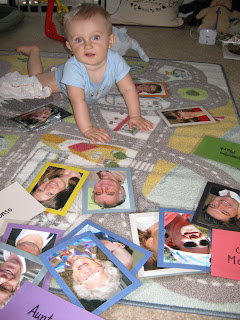 I still have two stockings from my childhood. One is from my grandma van der Werf, which was carefully knitted in red, white, and green with a santa on it and my name across the top. The other was quilted with random fabrics from my grandma Janzen. Both have very different meanings for me and were part of different traditions. Nevertheless, I treasure both, especially the memories they bring.
I still have two stockings from my childhood. One is from my grandma van der Werf, which was carefully knitted in red, white, and green with a santa on it and my name across the top. The other was quilted with random fabrics from my grandma Janzen. Both have very different meanings for me and were part of different traditions. Nevertheless, I treasure both, especially the memories they bring.I decided this year that stockings would be a good tradition to start with my family. I didn’t have the time to really plan out the patterns for each stocking, so in essence, they made themselves along the way. I made four stockings, since I am pregnant with boy number two, and cut out pieces for another one, just in case. I’m sure if I get pregnant again, I might not have time to make another stocking with two boys running around, and I didn’t want child number three to have the quickly boughten commercial stocking.
I wanted to make each stocking similar, but yet individual. This was easy for Jonas. He loves tractors and anything that has wheels. The patterns for the other stockings took a little more thought, and if the boy on the way doesn’t like cars, I’ll have to make him another stocking. Here’s the how to:
 1. I first went to the fabric store and bought a bunch of Christmas fabric that matched well together. Then I made a pattern for the stockings (I laid down a sock on a piece of paper and drew around it), and cut out all of the socks out of red Santa suit like material.
1. I first went to the fabric store and bought a bunch of Christmas fabric that matched well together. Then I made a pattern for the stockings (I laid down a sock on a piece of paper and drew around it), and cut out all of the socks out of red Santa suit like material.2. Then I cut out squares of the other fabric and ironed Wunderunder on the back of it. I drew stars and circles on construction paper and used these as patterns. Then I laid these patterns on the Wunderunder and drew around them. Finally, I cut out the stars, balls, stocking toes and heels out of the Wunderunder-ironed material and placed these on the stockings where I wanted them. Then, they were ironed into place.
3. Since the names were ironed onto a piece of felt, I had to sew the felt onto the stocking. I then used the sewing machine to sew around some of the stars, the toes and heels, etc. so that they looked like they had been sewn on and not ironed on.
4. I used some white chenille fabric for the tops of the stockings. Sewing this onto the tops of the socks was like sewing a cat (Sorry, but, it’s the first thing that came to mind). I had never sewn chenille before, and you really can’t see what you are doing at all through all that hair. In the end, luckily, it looked alright.
 5. Finally, I laid the reverse sides of the stockings together and sewed around the original sock drawing and then turned them back right-side-in. Now, I could see the finished product. I possibly could have made them bigger. I don’t think an orange would fit in the toe. But, then again, who gets an orange for Christmas anymore? I hung a little loop at the top and then voila they were finished. Maybe next year I’ll get them hung up before the 23rd of December. By then, Jonas will be big enough to look forward to what’s inside.
5. Finally, I laid the reverse sides of the stockings together and sewed around the original sock drawing and then turned them back right-side-in. Now, I could see the finished product. I possibly could have made them bigger. I don’t think an orange would fit in the toe. But, then again, who gets an orange for Christmas anymore? I hung a little loop at the top and then voila they were finished. Maybe next year I’ll get them hung up before the 23rd of December. By then, Jonas will be big enough to look forward to what’s inside.









.jpg)
.jpg)









.jpg)


.jpg)